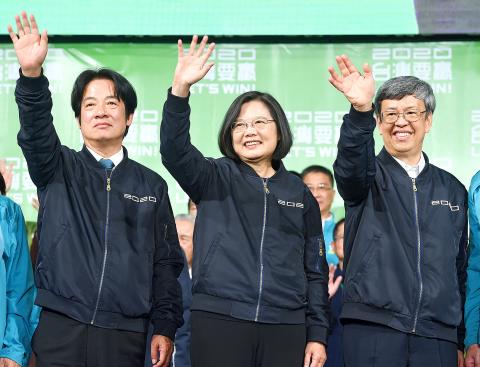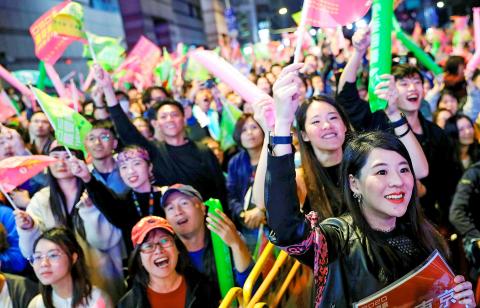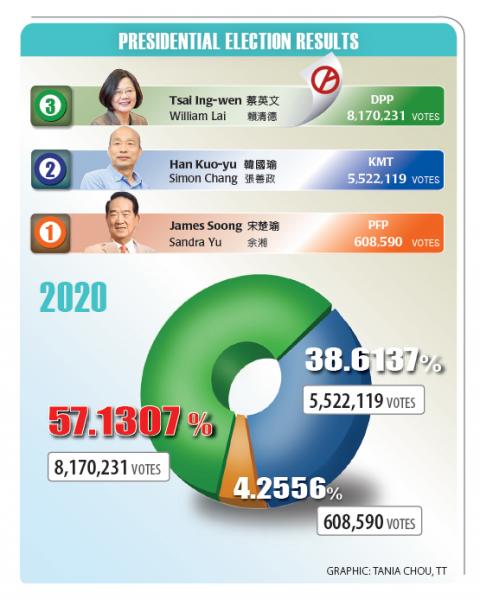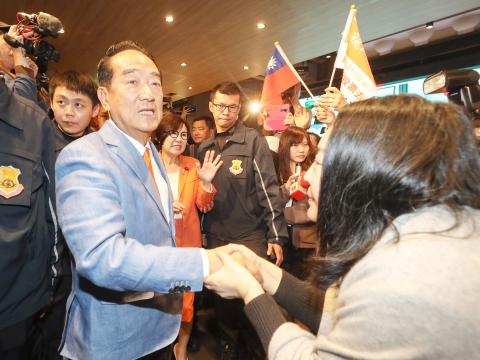President Tsai Ing-wen (蔡英文) of the Democratic Progressive Party (DPP) triumphed in the presidential election yesterday, crushing the Chinese Nationalist Party’s (KMT) hopes for a return to power by taking 57.1 percent of the vote.
Tsai secured a second term in office in a landslide victory against the rival tickets of Kaohsiung Mayor Han Kuo-yu (韓國瑜), the KMT’s presidential candidate, and his vice presidential candidate, former premier Simon Chang (張善政); and People First Party (PFP) Chairman James Soong (宋楚瑜) and his vice presidential candidate, former United Communications Group chairwoman Sandra Yu (余湘).
Voting took place between 8am and 4pm at 17,226 polling stations nationwide.

Photo: Chien Jung-fong, Taipei Times
The ticket of Tsai and her running mate, former premier William Lai (賴清德), won 8,170,231 votes, or 57.13 percent of the 19,311,105 registered voters, with the Han-Chang ticket garnering 5,522,119 votes (38.61 percent) and the Soong-Yu ticket receiving 608,590 votes (4.26 percent).
The total number of votes that Tsai received increased by 1,275,442 from 6,894,744 in 2016, when she received 56.1 percent of the total vote. It also surpassed the record of 7,659,014 votes that then-KMT presidential candidate Ma Ying-jeou (馬英九) received in the 2008 presidential election.
The votes for the KMT’s ticket yesterday increased by 1,708,754 from 3,813,365 in 2016, when it received 31.0 percent of the total vote.

Photo: Tyrone Siu, Reuters
In 2016, Soong garnered 1,576,861 votes, or 12.8 percent of the total vote.
In her victory speech, Tsai pledged “to do more and to do better” in her second term, adding: “We will not forget to engage in introspection just because of the [electoral] victory.”
Expressing gratitude to people who voted, she said that regardless of whom they voted for, “it is an implementation of democratic values.”

With every presidential election, Taiwanese tell the world that “we cherish the democratic way of life and cherish our country, the Republic of China (Taiwan),” she said.
She said she would listen to constructive criticism that Han and Soong have to offer.
Tsai said that her administration would continue to push for reforms, make progress with national construction projects, and close the income gap between rich and poor people.

Photo: CNA
She added that she would continue to keep the nation safe and protect its sovereignty.
“I also hope that Beijing understands that democratic Taiwan, and our democratically elected government, will not give in to threats and intimidation,” Tsai said.
Han conceded defeat last night, saying that Tsai had won a second term.
Han said that he had not tried hard enough and let his supporters down.
He asked people to remain calm, adding: “I have called President Tsai to congratulate her. She has a new mandate for the next four years.”
Han told supporters in Kaohsiung that he expects to see a united Taiwan, and that Tsai would lead the nation to a happier life.
Han, who took time off from his mayoral duties to campaign for the presidency, is to return to his Kaohsiung post tomorrow.
Soong also conceded defeat.
Expressing gratitude for the people who supported him, Soong said that he respected the decision of the nation, as the process is a reflection of Taiwan’s democratic values.
Soong said it was important that the government form a professional administration, and not resort to cronyism and nepotism, which would mar the civil service and negatively affect the public through reckless reforms.
Additional reporting by AFP and CNA

TRAGEDY STRIKES TAIPEI: The suspect died after falling off a building after he threw smoke grenades into Taipei Main Station and went on a killing spree in Zhongshan A 27-year-old suspect allegedly threw smoke grenades in Taipei Main Station and then proceeded to Zhongshan MRT Station in a random killing spree that resulted in the death of the suspect and two other civilians, and seven injured, including one in critical condition, as of press time last night. The suspect, identified as a man surnamed Chang Wen (張文), allegedly began the attack at Taipei Main Station, the Taipei Fire Department said, adding that it received a report at 5:24pm that smoke grenades had been thrown in the station. One man in his 50s was rushed to hospital after a cardiac arrest

SAFETY FIRST: Double the number of police were deployed at the Taipei Marathon, while other cities released plans to bolster public event safety Authorities across Taiwan have stepped up security measures ahead of Christmas and New Year events, following a knife and smoke bomb attack in Taipei on Friday that left four people dead and 11 injured. In a bid to prevent potential copycat incidents, police deployments have been expanded for large gatherings, transport hubs, and other crowded public spaces, according to official statements from police and city authorities. Taipei Mayor Chiang Wan-an (蔣萬安) said the city has “comprehensively raised security readiness” in crowded areas, increased police deployments with armed officers, and intensified patrols during weekends and nighttime hours. For large-scale events, security checkpoints and explosives

A car bomb killed a senior Russian general in southern Moscow yesterday morning, the latest high-profile army figure to be blown up in a blast that came just hours after Russian and Ukrainian delegates held separate talks in Miami on a plan to end the war. Kyiv has not commented on the incident, but Russian investigators said they were probing whether the blast was “linked” to “Ukrainian special forces.” The attack was similar to other assassinations of generals and pro-war figures that have either been claimed, or are widely believed to have been orchestrated, by Ukraine. Russian Lieutenant General Fanil Sarvarov, 56, head

PUBLIC SAFETY: The premier said that security would be tightened in transport hubs, while President Lai commended the public for their bravery The government is to deploy more police, including rapid response units, in crowded public areas to ensure a swift response to any threats, President William Lai (賴清德) said yesterday after a knife attack killed three people and injured 11 in Taipei the previous day. Lai made the remarks following a briefing by the National Police Agency on the progress of the investigation, saying that the attack underscored the importance of cooperation in public security between the central and local governments. The attack unfolded in the early evening on Friday around Taipei Main Station’s M7 exit and later near the Taipei MRT’s Zhongshan